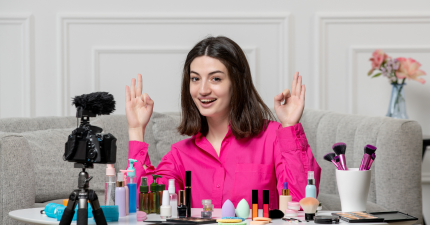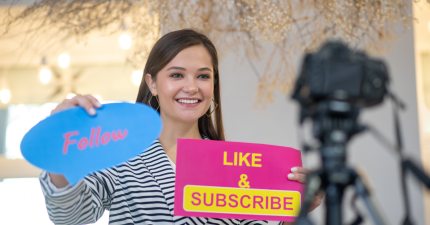
- 30 Sep, 2024
How to Get Sponsorship in 2025 - The Complete Guide
Sponsorships are no longer reserved for celebrities or massive influencers. In 2025, anyone with an engaged audience, unique idea, or strong brand presence has the potential to secure a sponsorship.
Whether you are a content creator, startup founder, student, or event organizer, the opportunity to collaborate with brands has never been greater.
This guide walks you through the exact steps to get sponsored in 2025, covering everything from building your presence to pitching brands successfully. If you're ready to turn your influence into income, read on.
Why Sponsorships Matter in 2025
The sponsorship landscape has shifted significantly in the last few years. Brands are no longer focused solely on reach; they now prioritize engagement, alignment, and authentic storytelling.
As a result, even creators with smaller but highly engaged audiences are in demand. In 2025, brand budgets are moving away from traditional ads and into creator partnerships.
If you have a loyal community, consistent content, or a meaningful cause, brands are more likely to notice and invest in you. Sponsorships offer not only financial support but also credibility, exposure, and long-term partnership opportunities.
Key reasons sponsorships are growing in 2025:
- · Brands trust creators over traditional ads.
· More industries are open to influencer collaborations.
Who Can Get Sponsored in 2025
Today, almost anyone can land a sponsorship deal if they approach it correctly. It's not just about follower count; it's about delivering value, having a niche, and showing consistency.
Brands are partnering with people and organizations that align with their values and reach the right audience.
You don't need to be famous to get noticed. If you have a specific niche and an engaged audience, even small collaborations can lead to long-term partnerships.
The key is to present yourself as a valuable partner who understands how to deliver results.
Common categories of people and groups who get sponsored:
· · YouTubers, podcasters, Instagram and TikTok
creators.
· · Student leaders, college event organizers, and cultural fests.
· ·Startups, app developers, and bootstrapped businesses.
· ·Gamers, writers, artists, and niche bloggers.
Build a Strong Brand Presence
Before reaching out to sponsors, you must have a professional and consistent online presence. Brands will look at your digital footprint to evaluate whether you are a good fit. Your content, profile, and engagement all influence their decision.
Make sure your social media profiles or website clearly communicate who you are, what you do, and who your audience is. Consistency in tone, design, and posting frequency can boost your credibility and attractiveness to sponsors.
Key elements of a strong brand presence:
· Clear and professional profile photo and bio· Consistent posting schedule and content style
· Audience engagement and interaction in comments
· Defined niche and messaging
Create a Media Kit or Sponsorship Deck
A media kit is a digital portfolio that shows sponsors everything they need to know about you. It helps you appear professional and organized while giving brands the information they require to make decisions quickly. Your kit should tell your story while focusing on the value you provide.
You can design your media kit using tools like Canva, Notion, or Google Slides. Make sure it's visually appealing, easy to navigate, and highlights your achievements and audience statistics.
What to include in a media kit:
· Your bio and niche· Audience insights (age, location, engagement rate)
· Past brand collaborations and results
· Package options and pricing (if applicable)
· Contact details and links to social media
Find the Right Brands to Pitch
The best sponsorships happen when there is genuine alignment between the creator and the brand. Instead of reaching out to hundreds of companies randomly, focus on finding those that match your niche and values. Relevance is key to getting a positive response.
Spend time researching brands that have sponsored creators like you. Look for companies actively engaging in creator partnerships and who are within your industry or target demographic.
How to find sponsor-ready brands:
· Check who sponsors creators in your niche· Use platforms like iCollabz.
· Search LinkedIn for brand managers or marketing heads
· Look for active campaigns on Instagram and YouTube
Pitch the Right Way
Once you've identified potential sponsors, it's time to craft your pitch. Your pitch should be short, personalized, and focused on how you can help the brand meet its goals. Avoid sending generic emails — instead, tailor each message to the specific brand.
The goal is to highlight the value you can bring. Mention your audience, past results (if any), and how your content aligns with their brand. Attaching your media kit can help them quickly understand your potential.
Tips for writing a good sponsorship pitch:
· Use a clear subject line with your name and niche· Personalize the message — mention the brand's recent work
· Clearly state your value and what kind of partnership you're proposing
· Keep it under 200 words
·Include links to your media kit and social profiles
Negotiate and Deliver Value
Once a brand responds positively, be ready to discuss deliverables, timelines, and compensation. Whether it's a paid collaboration, affiliate partnership, or barter deal, be professional and clear about expectations. You should also be open to negotiating based on the brand's needs and your own value.
The key to long-term success is delivering more than what you promise. Brands appreciate creators who are reliable, proactive, and results-driven. Track performance, gather insights, and follow up with a report when the campaign ends.
Things to clarify when negotiating:
· Deliverables (number of posts, format, platforms)· Timeline for content delivery and approval
· Payment terms or affiliate structure
· Usage rights and repost permissions
· Performance expectations (clicks, views, signups)
iCollabz - Where Brands and Creators Unite
Finding and managing sponsorships on your own can be challenging. That's where iCollabz comes in. iCollabz is a smart collaboration platform built for 2025, designed to connect creators, startups, and student leaders with brands looking to sponsor projects that matter.
Instead of spending hours sending cold emails, creators can now get matched with verified brands that are actively seeking collaborations. With a user-friendly dashboard, real-time tracking, and brand matchmaking features, iCollabz makes the sponsorship process easier and faster.
Why use iCollabz for sponsorships:
· Get matched with brands based on your niche.· Negotiate and secure deals directly through the platform.
· Track outreach, conversations, and results.
· Trusted by thousands of creators and brands across industries.
Visit www.icollabz.com to join today and get your first brand match in just a few days.
Common Mistakes to Avoid
Many creators make avoidable errors that cost them sponsorship deals. Understanding these mistakes can save you time and increase your chances of success. From poorly written pitches to overpromising on deliverables, small errors can have big consequences.
Approach sponsorship like a professional relationship. Brands want to work with creators who are organized, realistic, and data-driven. Being transparent and prepared sets you apart from the majority.
Common mistakes to avoid:
· Sending the same pitch to every brand.· Overstating your reach or audience.
· Ignoring response emails or failing to follow up.
· Not having a clear pricing model or deliverable structure.
· Missing deadlines or delivering low-quality content.
Final Thoughts
Sponsorship in 2025 is both an art and a process. It requires consistency, research, and a clear understanding of your value as a creator or brand. With the right preparation and tools, even small creators can secure meaningful collaborations that boost income and exposure.
Remember, success doesn't come overnight. Start small, refine your pitch, and stay persistent. Focus on building relationships and delivering real value — and the right sponsors will follow.
if you're serious about landing brand deals, take the first step today:
· Download our free pitch email template.· Build your media kit using our sample design.
· Sign up for iCollabz to connect directly with top brands.
Have questions about pitching or want feedback on your media kit? Leave a comment, and we'll help you out.




